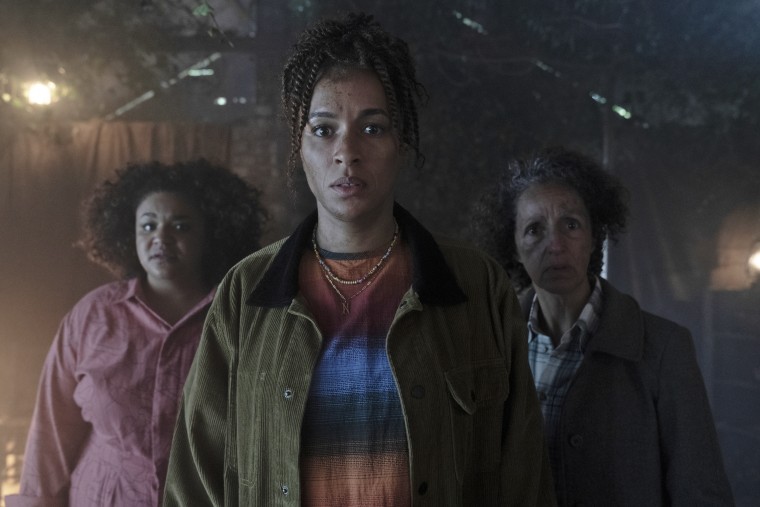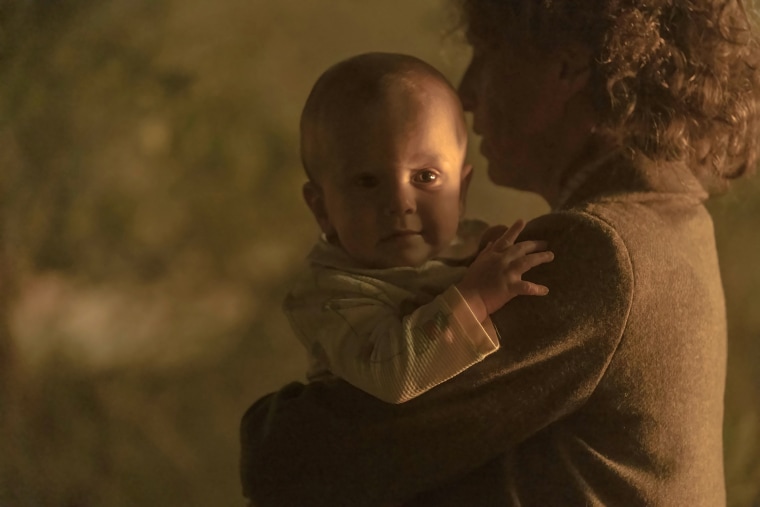HBO’s new British comedy-horror series “The Baby” — about an adorable, yet demonic, newborn — is a prescient reminder of how terrifying life can be as a woman of reproductive age.
Inspired by classics like “Rosemary’s Baby” and “The Omen,” the show explores motherhood through a queer, female-centric lens and a post-Jordan Peele sensibility.
Michelle de Swarte and Amber Grappy play Natasha and Bobbi, two sisters trapped in the lethal newborn’s web. Natasha (de Swarte) is the charming but often self-absorbed protagonist, who becomes more antagonistic to the idea of childbirth with every close friend who succumbs to it. After all, she’s already had a bitter taste of motherhood, raising her younger sister (Grappy) after her father came up short as a single dad.
But Natasha’s past doesn’t prevent her friends from being irritated by her offensive, even hostile, humor. After ruining their regular poker night with pointed comments about a friend’s newborn, Natasha takes a solo vacation to regroup.
She ends up at a cliff-adjacent beach shack that comes with a pitiless host, a creepy garden gnome and a level of disrepair that implies something haunting is about to happen. When Natasha comes face to face with what that something is, it is way worse — and significantly cuter — than she could have imagined.
The evening she arrives, Natasha is outside smoking when her solace is interrupted by a woman falling out of the sky and splattering on the ground a few feet from her. Not far behind, the titular baby comes tumbling down and lands in Natasha’s outstretched arms. From then on, no matter how much she protests, she just can’t shake the bundle of joy. The little Damien clearly wants Natasha and will get rid of anyone in the way, often opting for a bizarre accident followed by bouncy gurgling.
“It’s every woman’s story. If you choose to have kids, you’re a mom,” de Swarte told NBC News, emphasizing “mom” in a way that sounded a bit like “captive.” “You’re a mom, so now you do all these things that other moms do.”
In a nod to gaslighting classic “Rosemary’s Baby,” everyone around her seems to conveniently forget that Natasha didn’t have a baby as of just a few days ago. And at dizzying speed she’s pulled into a world of judgmental, Stepford moms and chaos-ruled play zones, all while attempting to figure out how to rid herself of the often cute, very often creepy baby saddled to her side.

The only one who questions the baby’s unexplained arrival is Bobbi, who is dealing with her own modern parenting nightmare: gay adoption. Carrying her own set of baggage from the sisters’ childhood, Bobbi is clearly desperate for a baby, which appears in both weighty and amusing moments (when she’s introduced in episode three, Bobbi coerces her partner, played by Genesis Lynea, into practicing a cringeworthy, magic-themed sales pitch for their case worker, which is entertainingly botched later on). But, unlike Natasha, Bobbi can’t just materialize a newborn.
“It’s a really important story to tell. It’s something that’s not often seen in mainstream media, especially a Black queer couple looking to adopt,” Grappy said of portraying a character who faces hurdles to motherhood because of her sexuality. “There are definitely biases within that system, still, that make it a lot more difficult for a lot of people to adopt a child and create a family.”
“For Bobbi, her complexities around wanting to create a family stem from a lot of things that have happened in her past with her family,” she added.
In multiple ways, the sisters are two sides of the same coin: survivors of an unhappy childhood who emerge with different feelings about childbirth. Through these dichotomies, and storylines that emerge later in the series, the show poses questions about why some people are expected to have children, while others aren’t, and what are the dangers of that.
Natasha, who reads as sexually fluid — a choice made by de Swarte, who is bisexual, and Siân Robins-Grace, who co-created the series with Lucy Gaymer — can presumably have children without intervention. So it’s easy for her friends and family to assume, even expect, that she’s the biological mother of a baby that looks nothing like her. But Bobbi, despite enthusiastically wanting a baby, is at the mercy of the adoption system and her feelings about her sister’s perceived fortune.
Although neither de Swarte nor Grappy have immense acting experience — a former model turned stand-up comedian and a recent graduate of the London Academy of Music and Dramatic Art, respectively — they effectively sell their characters’ opposing brands of trauma and divergent views on motherhood. They credit that, and their casting, with how much of themselves they saw in the script.
“When you’re presented with a role, sometimes you get a lot of stuff for free, in terms of how deep you have to dig to access your character,” Grappy said, pointing to the similarities between her and Bobbi’s mannerisms and demeanors, as well as their relationships with people.
What she didn’t get “for free,” as a 21-year-old actor, was how much her character thought about motherhood: “It brought up a lot of conversations around the expectation on people who can have children to have children, and how that expectation is imposed from such a young age, and how that sort of forms us as we are now. It’s got me thinking more about it than I ever have before.”
On the other hand, de Swarte, who was raised by a single mother, said she has thought about motherhood often.
“I’ve always been very adamant that I never wanted to have my own kids. And, like Natasha, part of that was because I spent a significant amount of my childhood looking after my younger sibling,” de Swarte said. “It didn’t leave any sort of illusion about how taxing it is.”
De Swarte was unknowingly scouted for the role during a corporate stand-up gig, performing comedy over Zoom, which happened to be attended by the husband of the show’s casting director. Despite having only one acting credit to her name — playing Bev in the one-season series “The Duchess” — de Swarte shares her character’s easy charm and irreverent sense of humor, which made her a shoo-in to play Natasha.
“When you’re a stand-up comic and you get cast for things, generally, the team sees something about you that is similar to the character, and there were a lot of things I could relate to with Natasha.
“I’d like to think I’m, hopefully, a little bit more developed. I’ve been in therapy for years and that stands for something,” she said with a self-deprecating smile.
While she’s a huge fan of horror, de Swarte found most of her inspiration in the women who raised her, in what she described as a “very matriarchal, queer family.” (She added, somewhat jokingly, “For some reason, I just have a very lesbian-heavy family.”)
“I took a lot from the women in my family that had all done the job on their own, pretty much,” de Swarte said, adding that these women “were really explicit about the hardships of motherhood.”
De Swarte said being familiar with the difficulties of parenting gave her plenty of understanding about what makes “The Baby” and its titular character so terrifying.
“To have to be loving and responsible and nurturing at all times is scary enough,” she said, adding especially when it’s a choice you haven’t made.
